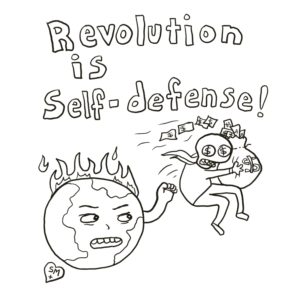
First the context:
A couple of years ago I received an email from a small local paper that included an invitation to be interviewed for an article about this:
“In our next issue, we want to include an article about How to better
take care of our environment. We want to draft an article with those
little actions people can do to help reduce problems regarding climate
change, protect ecosystems and natural resources such as water; the
ocean, and in general our planet. For instance, cleaning up beaches,
not buying bottled water, recycling, etc.”
My reply:
“Thank you for thinking of me! Would there be room in your article for me to address the overall systemic transformations that would be needed to stop environmental destruction? From my worldview, I can’t really address individual actions without putting it in a social context that questions the entire economy. If that would work for your piece, then I would like to participate. I could talk with you later today or sometime tomorrow. If not, then I’m probably not the right person to interview.”
We went back and forth a couple of times and I was pretty clear where I stood:
“I should tell you that my perspective is anti-capitalist, which might be kind of beyond the scope of your article.”
…but she said she still wanted to do it. So I talked with her on the phone, and then wrote up the following and sent it to her.
I never heard from her again…
****
5 Simple Daily Lifestyle Changes to Help Save the Planet:
1. Unite with your coworkers to struggle collectively against your employers for higher wages and shorter workdays in order to weaken the capitalist class and strengthen the working class as a whole to take over the means of production, defeat capitalism/imperialism (and its imperative to exploit labor for private profit through converting the natural world into commodities), and then run society in the interests of all, paving the way to end class divisions and ecocide altogether.
2. If you’re not part of the working class, act and build movements to act in solidarity with the struggles of workers against their capitalist exploiters, and for international working class unity, in order to weaken the global capitalist class, etc. (see above).
3. Speak up, act and build movements against all forms of oppression that serve class domination and imperialism. Dismantle institutional structures of oppression such as patriarchy, white supremacy, colonialism and nationalism while challenging individual expressions of these.
4. Free all domesticated land such as lawns, industrial monocrop farms, golf courses, and city swales and allow these areas to revert back to the wild; ban the use of synthetic fertilizers and pesticides; and make sure all of society’s food is cultivated and obtained in ways that are in harmony with the thriving of the natural world.
5. Act from the knowledge that ecocide is a consequence of the global capitalist class imposing its economy over the world. Both individual and collective acts of intended resistance can often be recuperated back into the capitalist framework, and we must strive to make sure that our actions actually contribute to the weakening of capitalist domination.
